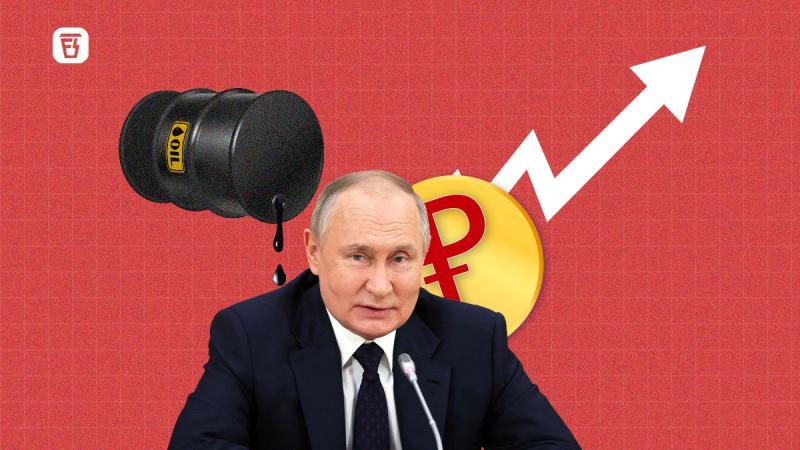Russia is now the fourth largest economy. But how?
By: shrehithk (Finshots)


The data is in. And the data shows that blocking supply-side, Free Trade economics spurs economic growth. Russia's economy is growing because it's productive (factory based) economy has been working overtime, the country can still export goods (albeit at a reduced level), and Russia has been prohibited from importing goods by international sanctions.
Joe Biden deliberately cut off Russia from the touted benefits of Free Trade using international sanctions - and - Russia has prospered. Russia has enjoyed the benefits of a winning economic combination: increased domestic production bolstered by more exports than imports. It's a Keynesian "told ya' so".

Russia is now the fourth-largest economy!
And it's not Russia or us saying this. It's the World Bank.
Last August, the World Bank released its PPP-based GDP (Purchasing Power Parity based Gross Domestic Product) data for global economies as of 2021. Simply put, it compared the economic output of different economies in the form of the goods and services they produced, while also considering their standards of living. And it found out that Russia overtook Germany to become the fifth largest economy.
A few days ago though, it revised that report. It said that its last report was based on obsolete data. And this fresh data shows how Russia actually overtook Japan to become the world's fourth largest economy in terms of PPP-based GDP in 2021, while also managing to stay on number four ever since.
But here's the thing. Ever since Russia began invading Ukraine, most Western economies like the US, UK and EU have slapped sanctions on it.
They've refused to accept a bunch of goods from Russia, while also denying non-essential exports to the country. They've cut off Russia from the SWIFT (Society for Worldwide Interbank Financial Telecommunication), a global interbank messaging network that helps facilitate international transactions between countries. Heck! They've even frozen nearly $300 billion worth of foreign reserves that Russia had parked with them as emergency savings before the war broke out.
Their motive behind this was simple. Hampering trade with Russia could cripple its economy and make it difficult for it to fund the war.
But let alone an economic decline, Russia's GDP has actually grown by over 3% last year.
So, how has it managed to defy the odds, you ask?
For starters, Russia's oil exports are still reaching the US and UK's fuel tanks. Thanks to a loophole that countries like China and India are banking on.
You see, Russia is the world's second largest crude oil exporter. And China and India are the two largest importers of it. Their transportation sectors depend on crude oil for most of their fuel. And they even process this crude oil to re-export the refined products to other parts of the world. But since they don't produce enough of it, they rely on imports.
And their oil imports from Russia only started rising after the Russia-Ukraine war took off. That's because Western sanctions meant that no one was willing to buy Russia's oil. So it had to actually sell the commodity at a discount to make it appealing for countries who couldn't cut off from it.
China and India obviously lapped up the cheaper oil, threw in crude oil from other countries during the refining process and legally exported it to the US and UK! That's because the "rules of origin" classify crude oil refined in a particular country as a product of that country even if it originated somewhere else.
You could look at India as an example. In FY23, the country was able to import Russian crude oil at an average price of $83 per barrel. But if you were to go by the Dubai crude benchmark, which sets the base price for most Indian crude imports, the same commodity would be $12 more expensive.
That's exactly why the Jamnagar Refinery, which is the world's largest, imports nearly a third of its crude oil from Russia now ― a stark contrast to importing nothing from Russia before the war. It then blends this with other foreign crude oil to refine it into petrol, diesel and other products that can be legally exported to American companies.
And the end result is that despite the myriad sanctions, Russian crude oil still makes its way into Western countries, boosting its economy.
But it isn't just the oil exports that are helping, but the war itself.
Yup! Russia's public spending has been on the rise ever since it declared war. Its Central Bank is even printing more money so that the government can spend on arms and ammunition, tanks and planes and even pay its armed forces, and compensate their families when they die. Not just that, Russia has been ramping up its industrial production over the last two years. Its factories are producing everything from boots to ammunition, running around the clock, often on mandatory 12-hour shifts with double overtime, to sustain the Russian war machine.
And this increased spending and production only adds up to its GDP.
But wait… Won't all of this excessive spending trigger inflation?
Actually, it has. In fact, the Ruble has even lost about a third of its value against the US Dollar in 2023.
But Russia had a magic bullet for that too.
Its Central Bank quickly cranked up interest rates so that it would become harder for people and companies to borrow and spend more money.
That aside, it has even made it tough for Western companies who are still operating in Russia to take out money from the country. To put things into perspective, foreign companies selling their Russian assets aren't allowed to withdraw the proceeds in Dollars and Euros.
Besides, Western companies winding up their businesses have to even agree on a sale price in Rubles. Insisting on receiving money in a foreign currency could only mean that they'd face delays or even suffer losses on the amounts that they can finally take back with them.
And money that stays within the economy can actually work as additional effective control against its devaluation.
So yeah, that's what's holding up Russia's economy so far. But is this war led growth sustainable in the long run? Most economists would disagree. But only time will tell.

Tags
Who is online
48 visitors


How can the United States fight an economic war when it has become all too apparent that no one in government knows how economics works?
The World Bank data suggests that weakening a country's economy requires making it more dependent on imports. We know, as a matter of fact, that the United States becoming more dependent on imports has weakened the US economy as demonstrated by the COVID pandemic. That's not some sort of elitist theory; that's a fact backed up by real world data.
Joe Biden actually created an economic opportunity for Russia by imposing international sanctions. The data shows economic isolation was the best thing that could have happened to Russia.
The expansion of the Russian economy while under international sanctions should provide clues about the failure of similar sanctions against smaller countries like Cuba, North Kores, and Iran. Closing off access to imports forces an economy to become more self sufficient and resilient.
That's why the weaponization of economics by the global rule based financial system during the latter decades of the 20th century has failed to deliver promised results. The institutional economic punishment actually makes the isolated economy stronger and more resilient. The experienced results are contrary to theoretical expectations. So, maybe there is something wrong with the theories underpinning globalization.